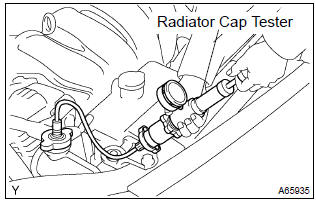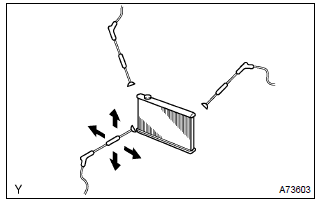Toyota Corolla (E120): On–vehicle inspection
1. Inspect cooling system for leaks

Caution
: to avoid the danger of being burned, do not remove the radiator cap while the engine and radiator are still hot, as fluid and steam can be blown out under pressure.
- fill the radiator with coolant and attach a radiator cap tester.
- warm up the engine.
- pump it to 118 kpa (1.2 Kgf/cm2, 17.1 Psi), and check that the pressure does not drop.
Hint
: if the pressure drops, check the hoses, radiator or water pump for leaks. If no external leaks are found, check the heater core, cylinder block and head.
2. Check engine coolant level at reservoir
- the engine coolant level should be between the ”low” and ”full” line.
Hint
: if low, check for leaks and add ”toyota long life coolant” or equivalent up to the ”full” line.
3. Check engine coolant quality
- remove the radiator cap.
Caution
: to avoid the danger of being burned, do not remove the radiator cap while the engine and radiator are still hot, as fluid and steam can be blown out under pressure.
- check if there is any excessive deposits of rust or scale around the radiator cap and radiator filler hole; the coolant should be free from oil.
Hint
: if excessively dirty, replace the coolant.
- reinstall the radiator cap.
4. Inspect fins blockage

- If fins are clogged, wash them with water or a steam cleaner and dry with compressed air.
Notice
:
- if the distance between the steam cleaner and core is too close, there is a possibility of damaging the fins, so keep the following injection distance.

- If the fins are bent, straighten them with a screwdriver or pliers.
- Be careful not pour water directly onto electronic components.
Other materials:
Hydraulic test
1. Perform hydraulic test
Measure the line pressure.
Notice:
Do the test at normal operation atf temperature 50 to 80 °c (122 to
176 °f).
The line pressure test should always be carried out in pairs. One
technician should observe
the conditions of wheels or wheel stopper outsi ...
Inspection
1. Thermostat
Hint:
the thermostat is numbered with the valve opening temperature.
Immerse the thermostat in water and gradually heat the
water.
check the valve opening temperature.
Valve opening temperature:
80 to 84 c (176 to 183 f)
Hint:
if the valve opening temperatur ...
Checking and replacing fuses
If any of the electrical components do not operate, a fuse may have blown.
If this happens, check and replace the fuses as necessary.
1 Turn the engine switch off.
2 Open the fuse box cover.
► Engine compartment
Push the tab in and lift the lid off.
► Under the driver’s side i ...


